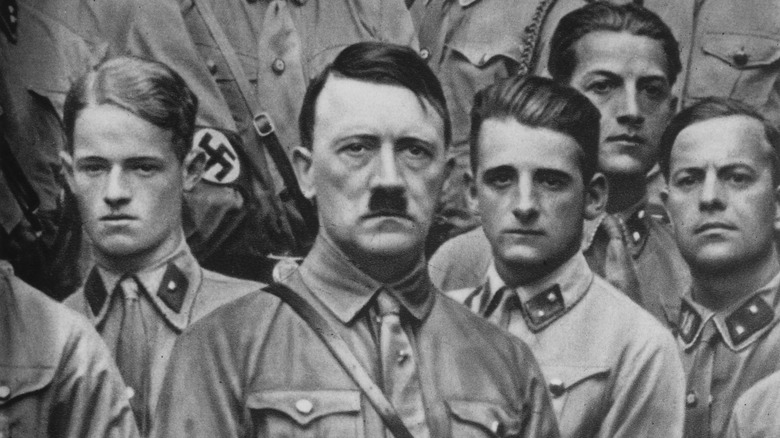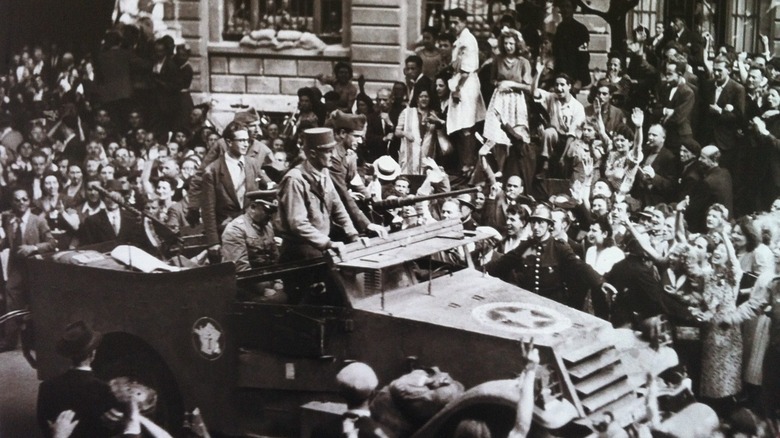The Nazi Commander Who Stopped Hitler From Bombing Paris During World War II
The first thing visitors to Paris might notice is how stunningly beautiful the place is. Not the parks — there's not a ton of grassy areas — but the architecture and overall layout. Paris was first settled in 259 B.C. when a Celtic tribe, the Parisii (aka, the Parisians), settled along the Seine river that currently cuts through the middle of modern Paris. That's not to say those ancient tribespeople started erecting gorgeous Neoclassic architecture overnight, but rather that Paris has had a long time to settle into its current form. That being said, the Khan Academy explains that much of modern Paris came into being when Emperor Napoleon III worked with administrator Baron Georges-Eugene Haussmann to modernize the city during the emperor's reign from 1852 to 1870. Napoleon III reformed Paris' streets and buildings into their modern shape and widened the old, cramped roads that had caused so much congestion.
And then along came the Nazis, like in many other 20th-century historical stories. We all know that the German Chancellor Adolf Hitler was mad about genocide, mad about war, and mad in general. As The Guardian explains, he even planned to destroy Germany's own capital, Berlin, and reform it into a horrifying industrial nightmare of concrete, brick, and a gargantuan 4.3-mile central lane leading to a Great Hall at Berlin's center. Thankfully, Hitler failed and died. He also failed at destroying Paris, which was on his dictatorial bucket list. One of his generals intervened and kept Paris whole.
A darkening of the City of Lights
Eight months after the Third Reich invaded Poland and officially kick-started World War II in September 1939, they invaded France. One month later in June 1940, Hitler and his goons reached the French capital, Paris. Eight days later France signed an armistice with Germany to save its own skin, and the country was divided into two regions: a German-occupied northern zone and a supposedly French-controlled southern zone. The occupied zone belonged wholly to the Nazis, and the rest to a puppet French government headquartered in Vichy. Paris was in the occupied zone, and to this day many Parisians feel sickened and ashamed at their country's and city's perceived easy capitulation to the Nazis, as The Washington Post reports.
The situation seemed hopeless, especially in Paris, a city long dubbed the City of Lights. That city went silent and dark under Nazi German occupation save for war sirens. The Washington Post quotes French writer Colette talking of that time, saying, "The cacophony of daily urban engagement — passersby, hawkers, street minstrels and performers, construction work, and especially traffic noise — was severely diminished." Paris withdrew into itself, and its "physical and psychological space" shrank. Citizens receded into its narrowest crevices, secreting away Jews and other "illegals" further and further. By the time 1943 rolled around and the tide of war turned against the Nazis, Hitler cast his gaze onto Paris. It was already his, and he wanted it destroyed.
A last-second rescue
By the time Hitler decided to obliterate Paris, he'd already decimated the Dutch city of Rotterdam, obliterated much of London, flattened Warsaw, but failed to destroy Stalingrad. History Net says Hitler was getting worried that Paris might be liberated come 1943. In an act of spite more than strategic value, he ordered Major General Dietrich von Choltitz — an officer from a military family who'd distinguished himself in Russia — to carry out the plan.
Choltitz admired the führer's fury, but deplored his "peasant's table manners," as History Net reports. The commander doubted Nazi victory and detested the idea of brute, "scorched-earth" tactics brought to bear against the world's most beautiful city. He was convinced that the Nazis would be "reverting to the Middle Ages" by destroying Paris. Nonetheless he followed through with his orders right to the very day of the intended annihilation. At the time French rebels were on the move to retake Paris, and Choltitz lied when asked if the destruction of the city had begun. He did so knowing that death was his punishment if he got caught.
Choltitz's move gave the French the time they needed, and on August 26, 1944, Allied forces retook Paris. The French General Charles de Gaulle held a liberation parade down the unbombed Champs d'Elysees, one of Paris' famed, gorgeous avenues. Nazi Germany, meanwhile, tried Choltitz for treason in absentia. The war ended before he or his family could be executed. Choltitz eventually died of emphysema in 1966.


